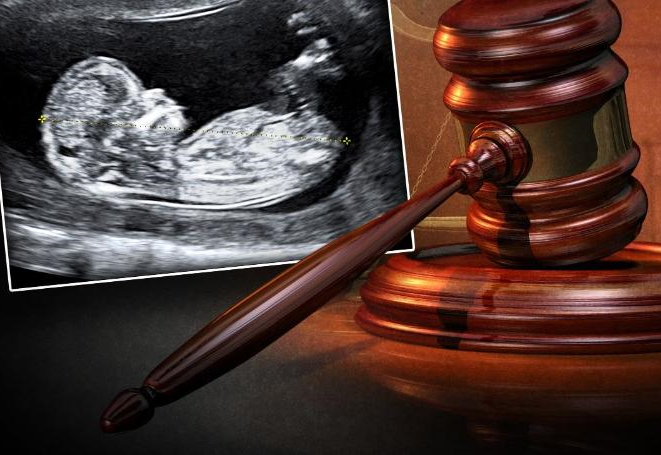The ACLU and a Cleveland abortion clinic have filed a lawsuit seeking to overturn the pro-life law Ohio Gov. Mike DeWine signed to ban abortions after an unborn baby’s heartbeat begins.
The law prohibits abortions after an unborn baby’s heartbeat is detectable, about six weeks of pregnancy. Because many women do not even know they are pregnant at this early stage, the legislation could protect almost all unborn babies in Ohio if it goes into effect. DeWine signed the bill despite threats by the American Civil Liberties Union to challenge it in court.
The Heartbeat Bill has been passed in seven other states, including Kentucky and Georgia and the Ohio law is slated to go into effect July 11 unless courts block it. If upheld the new law could save thousands of unborn babies’ lives. The Ohio Department of Health reported 20,893 abortions in 2017 in the state.
Today, the ACLU made good on its threat:
As promised, the ACLU and others are filing a lawsuit to halt Ohio’s most restrictive abortion law from going into effect – which could be the first stop in a legal battle that may end up before the U.S. Supreme Court.
Abortion opponents hope the high court, which is made up of more conservative justices than in the past, will ultimately overturn the landmark Roe v. Wade and other cases that have given women abortion rights for the past 46 years.
The plaintiffs in the suit — filed in federal court in Cincinnati — are the ACLU, the ACLU of Ohio, Preterm-Cleveland, New Voices for Reproductive Justice, Planned Parenthood of Greater Ohio and Planned Parenthood of Southwest Ohio.
Abortion opponents hope that regional federal appeals courts will have split decisions over the constitutionality of the heartbeat bills, which would prompt the U.S. Supreme Court to take the case and potentially overturn Roe v. Wade and other abortion case law.
The regional appeals court that covers Ohio – the Cincinnati-based Sixth Circuit Court of Appeals — is seen as key in abortion opponents’ legal strategy. The court could possibly be the only federal appeals court in the country to uphold the heartbeat law, which would create the split with other appellate courts.
“We believe that the heartbeat bill is the right vehicle for the Supreme Court to overturn Roe v. Wade. Our strategy has always included a federal court challenge and today starts that judicial process,” said Mike Gonidakis, president of Ohio Right to Life. “It’s no surprise that the ACLU is litigating life-saving laws and Ohio Right to Life is excited to defend the heartbeat bill all the way to our nation’s highest court.”
Gonidakis told LifeNews: “The Supreme Court has never been more favorable to pro-life legislation than it is right now. Regardless of what happens at the district court level, we expect to have better legal outcomes from both the full 6th U.S. Circuit Court as well as the Supreme Court. We believe that the Court will look back at the wrongly decided Roe decision and overturn it, allowing each state to establish its own pro-life standards. We’re confident that Ohio will continue to be on the forefront of protecting human dignity from conception until natural death.”
The Heartbeat Bill, when it goes into effect, will prohibit abortion when a human heartbeat can be detected. An abdominal ultrasound can detect a heartbeat between eight and twelve weeks. A recent Marist Poll found that 80% of Americans want to limit abortions no later than three months of pregnancy (12 weeks), and another poll found that 56% of voters are in favor of Heartbeat Bills specifically.
The pro-life governor made it clear in January that he would support a heartbeat bill. He told pro-lifers that the government’s job is to “take care of those who cannot take care of themselves,” including unborn babies.
DeWine acknowledged the likelihood of a lawsuit in an interview with conservative radio host Hugh Hewitt, but promised to fight for life anyway.
“Ultimately, this will work its way up to the United States Supreme Court. And they’ll make that decision,” DeWine said.
State lawmakers came close to passing similar pro-life legislation in 2016 and 2018, but then-Gov. John Kasich vetoed both bills.
Some pro-lifers have renewed hope that the new conservative-majority U.S. Supreme Court will uphold an abortion ban and overturn Roe v. Wade. Others, however, are hesitant because of concerns about losing the court battle and being forced to reimburse pro-abortion groups for their legal fees.
The Supreme Court took away the states’ ability to protect unborn babies from abortion under Roe v. Wade, and instead allowed abortion on demand through all nine months of pregnancy. Roe made the United States one of only seven countries in the world that allows elective abortions after 20 weeks. There is more hope that the new conservative-majority U.S. Supreme Court may consider overturning Roe, but it is difficult to say if it would for certain.








